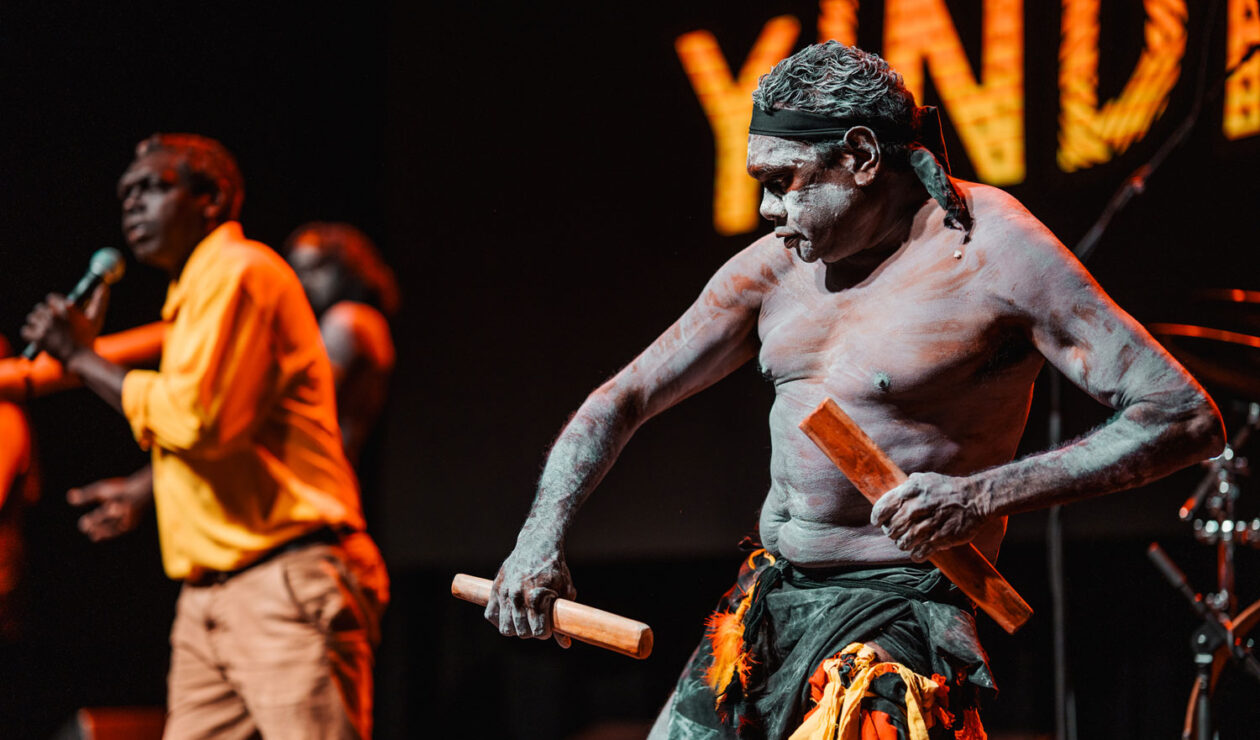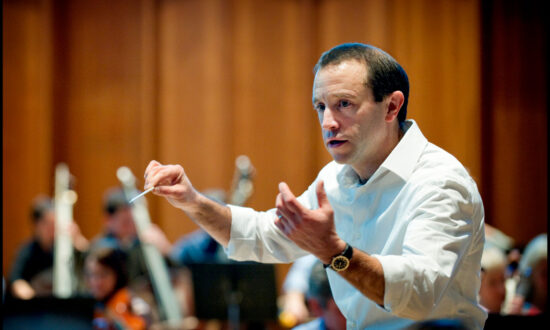Lining up out the front of Hindley Street Music Hall, it was apparent that Yothu Yindi’s powerful lyrics and spiritually potent grooves connect to the younger generations as much as the older ones. The mix of faces waiting for the band’s appearance is a sign of their ongoing relevance as creators of music that is in synergy with the current political discussions around the infrastructure needed to implement ideas of truth, treaty and voice.
Before Yothu Yindi took to the stage, the night kicked off with Emma Donovan – of the famous musical Donavon family – taking us to the sky with her earthy yet velvety growl. Blending rock, gospel, soul and country effortlessly, Donovan commanded the stage with the sheer magnetic power of her voice. The setlist had a good spread of oldies, newbies and covers, with the crowd thoroughly immersed by her nuanced performance across different genres.
Donovan’s new backing band accentuated her voice to perfection, shadowing the vocals through the light and shade of the dark alleys, bright churches and ancestral homelands to which the music took us. Amongst the bevy of originals was an earnest and heart-warming tribute suite to Uncle Archie Roach and Aunty Ruby Hunter that landed sweetly and sincerely. Those who dive deeply into Donovan’s catalogue – as this reviewer has recently – will be rewarded.

Emma Donovan commands the stage with the power of her voice. Photo: Saige Prime / supplied
After a rapid turnaround between acts, Yothu Yindi stormed the stage to raucous applause. The crowd was primed by Donovan’s passion, and was well and truly ready for the spiritual ceremony of sound and dance to begin.
Yothu Yindi started with the traditional Yolngu song “Gapu”, the opening track of their 1991 album, Tribal Voice. What followed was a heart-pounding and foot-thumping, one-and-a-half hour journey through much of the band’s iconic second album. It was arranged, played and mixed in such a way that the bilma (clap sticks) particularly pierced through the controlled cacophony generated by the instruments more associated with rock ‘n’ roll music. They became an omnipresent reminder of the band’s roots and their message of unity.
The show’s highlight, judged by the hearty volume of the crowd, was the extended singalong to “Djapana (Sunset Dreaming)”, coupled with the explosive crowd favourite “Treaty”, which ended the set with everyone dancing true to their spirit. After a few minutes of us pleading for more, Yothu Yindi graciously obliged with an encore culminating in a deft and heavy rendition of their song “Maralitja (Crocodile Man)”, penned by original lead singer Dr Mandawuy Yunupingu, whose ancestral totem was the saltwater crocodile.

Empowering and joyously reverent: Yothu Yindi. Photo: Saige Prime / supplied
Only three members of the original band are still present in the current line-up, but Yothu Yindi has always been a collective – a tribe, if you will – coming together to teach, heal and celebrate. The remaining and the newer members bring a fierce edge to their live renditions, meaning the main difference between Yothu Yindi now and then is the absence of those gone and perhaps the metres the band covers on stage.
Many will remember being washed heavily in the sound waves of Yothu Yindi as children, and at certain points during the show, those memories were brought forcefully to the surface. This powerful link between music and memory recovery is something Yothu Yindi seems to understand deeply. They also practise another kind of remembrance in their music, with impressive feats of fusion jam-packed into much of their back catalogue. They effortlessly blend Yolngu songs and instruments with reggae, funk, rock and techno, never losing the heartbeat and foundation of their traditional culture.
The night was unifying, empowering, spiritual and joyously reverent – leaving those who attended energised by the powerful fusion of old ways into new forms and the unshaken clarity of Yothu Yindi’s tribal voice.
Yothu Yindi played the Hindley Street Music Hall during NAIDOC week on Friday, July 7, as part of Illuminate Adelaide. Read more Illuminate Adelaide reviews and stories here.

Get InReview in your inbox – free each Saturday. Local arts and culture – covered.
Thanks for signing up to the InReview newsletter.
Kyron Weetra is a proud Nharangga/Saxon clan man. He is one of the first recipients of the Arts SA and InReview First Nations Arts Writing Mentorship. Kyron is working with experienced writer, visual artist and curator Troy-Anthony Baylis – who is a descendant of the Jawoyn people from the Northern Territory and is also of Irish ancestry – to write a series of articles for publication in InReview.
Support local arts journalism
Your support will help us continue the important work of InReview in publishing free professional journalism that celebrates, interrogates and amplifies arts and culture in South Australia.
Donate Here




